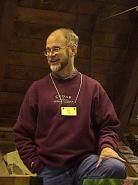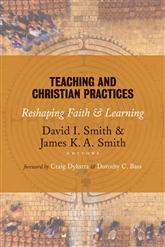
With the new term opening, let’s get serious with Bob Trube’s review of Teaching and Christian Practices: Reshaping Faith and Learning (David I. Smith & James K.A. Smith, editors. Eerdmans, 2011) and a few bonus articles. Please feel free to comment on the project, book, bonus articles, even supply additional resource links to expand the conversation 🙂
Note to all our readers: As I have done previously, I encourage you to read a book before you comment upon it 🙂 It’s my intention that reviews such as those offered by Bob will not only provide opportunity for dialogue by those who have read the material, but also serve as teasers — helping our readers discern what books to place in their personal and book discussion group queue. If you have books you desire to review and/or have reviewed, please email me. ~ Thomas B. Grosh IV, Associate Director of ESN, editor of ESN’s blog and Facebook Wall.
Teaching and Christian Practices: Reshaping Faith and Learning (David I. Smith & James K.A. Smith, editors)

Most often, the integration of faith and learning in my experience has taken the form of a cognitive exercise asking how Christian doctrine relates to the questions and practices of a particular field of inquiry.
This volume, reflecting research funded by the Valparaiso Project on the Education and Formation of People in Faith, pursues the question of whether it is possible to weave into educational pedagogy Christian practices congruent with course material that form in the participants virtues and outlooks reflecting a Christian perspective on the discipline in question. The faculty contributing to this volume spanned the spectrum from nutrition to physics to philosophy to economics. Practices included such things as sharing meals together (nutrition), using the labyrinth as a backdrop for the progression of topics in physics, to charitable reading in literature to biblical interpretive practices as a lens for the interpretation of econometric data.
One of the assumptions in all this is that we become what we practice. One challenge in this particular setting was creating sufficient opportunities for practice where the disciplines could work deeply into a person’s life. When a form of examen was used in personal journaling, this can work. When mid-day prayers are incorporated into a class that only meets twice a week–this had less impact.
One of the striking results was that the practices changed the teachers as well as the students. Equally, there were numerous instances of students making connections between practices and course material — as well as many failures to draw the connection. One factor that bears more study is the influence of prior experience — how deeply embedded are these practices and an understanding of their significance in the lives of students?
I was reading this book while also reflecting on the significance of personal and communal disciplines of attentiveness to God and their shaping influence on the academic as well as spiritual formational experience of graduate students. Attentiveness to and humility before the biblical text, for example, seems connected to a similar attentiveness and humility before the object of one’s study. All of this reinforced a deep and long-standing conviction that the love of God and the love of learning are deeply intertwined.
————————–
BONUS:
“From Coffee Shop to Book Shop: The Conception of Teaching and Christian Practices” by James K. A. Smith. EerdWord. Eerdmans, 19 Sept. 2011. Web. 30 Aug. 2013.
“Habits of the Heart & Mind: Teaching and Christian Practices” by Jesse Covington, Maurice Lee, Sarah L. Skripsky, and Lesa Stern. Books and Culture. July-Aug. 2012. Web. 30 Aug. 2013.
“The Practice of Christian Pedagogy” on Mars Hill Audio Conversations. Web. 30 Aug. 2013. Note: “In this MARS HILL AUDIO Conversation with Ken Myers, David Smith —director of the Kuyers Institute for Christian Teaching and Learning at Calvin College —describes how he came to realize that the shape and texture of pedagogy was as important as the content of knowledge presented in the classroom. Additional information and excellent resources, including practical examples, about teaching practices that shape students Christianly can be found at the What If Learning website.” Although the Mars Hill Audio Conversation costs $5 to download, the What If Learning website has a significant amount of material to explore at no cost 🙂
Bob Trube is a former Associate Director of Faculty Ministry and Director of the Emerging Scholars Network. He blogs on books regularly at bobonbooks.com. He resides in Columbus, Ohio, with Marilyn and enjoys reading, gardening, choral singing, and plein air painting.

Leave a Reply